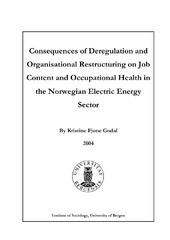| dc.description.abstract | The study, on which this thesis is based, is part of a larger research program entitled Work Design, Productivity and Health funded by the Norwegian Research Council as part of the Health in Working Life research program. The longitudinal study was conducted in thirteen electricity generation and distribution companies in Norway from 1999 to 2002. There has been a change in the work organisation in the Norwegian electric energy branch since the deregulation in 1991. The new competitive situation for the electric energy sector has led to a need for restructuring and flexibility. The industry has been forced to change its primary focus from engineering and technical issues to a critical concern on customers, service, operational costs and productivity. This thesis tries to detect any consequences of deregulation and restructuring on job content and occupational health using Robert Karasek and Töres Theorell’s Demand/Control Model as a basis. The analyses showed small overall changes in psychological job demands, job control, social support and team work from 1999 to 2002. However, on item-level, some of the variables from the demands and control scales showed significant changes from 1999 to 2002. Regression analyses were done to detect if psychological job demands, job control, social support, team work and leadership had any influence on job stress, job satisfaction and subjective health complaints. The results showed that psychological job demands had a negative effect on job stress, job satisfaction and subjective health complaints. Job control and social support had, on the other hand, a positive effect on the same dependent variables. The leadership variable was positively related to job stress and job satisfaction, but negatively related to subjective health complaints. In this study team work had generally little effect on the dependent variables, except from a positive correlation to job satisfaction. The results in this study corroborate previous results and suggest that the Demand/Control Model can be used as a practical approach in understanding healthy work in the Norwegian electric energy branch. Key words:Deregulation, psychological job demands, job control, social support, the Demand/Control Model, team work, learning, sick leave, job stress, job satisfaction and subjective health complaints. | en_US |
